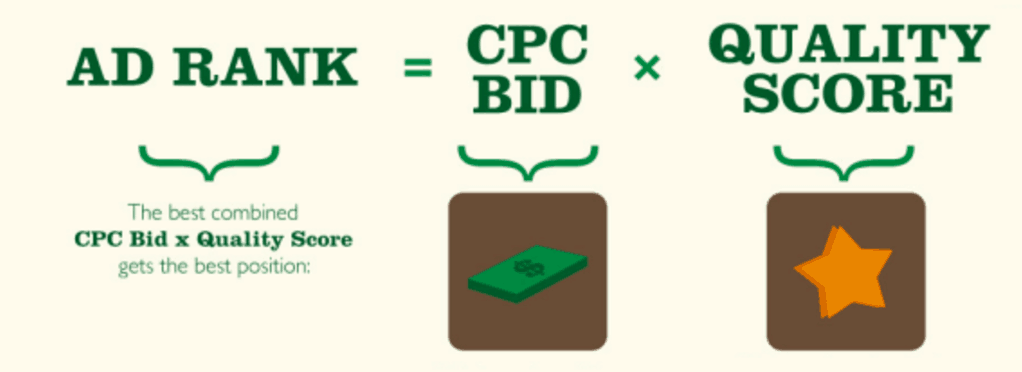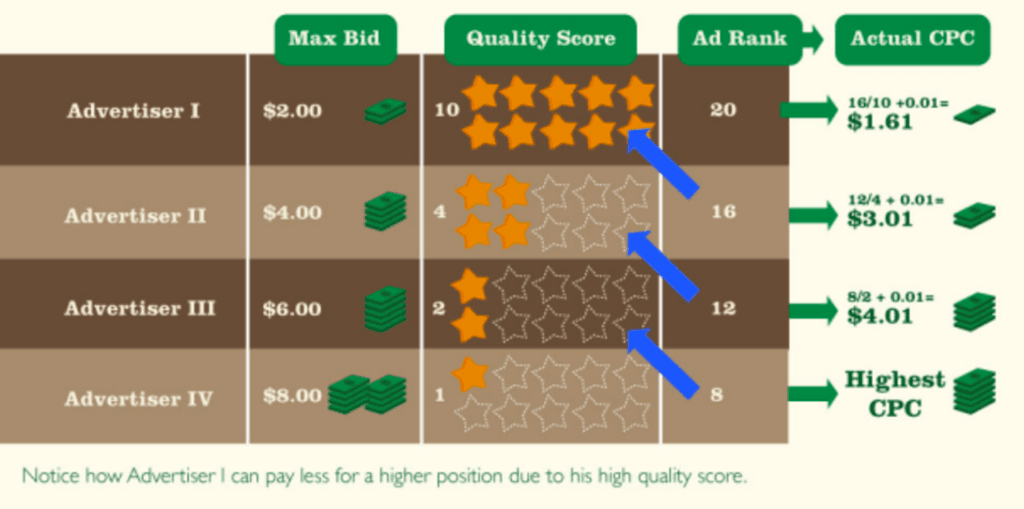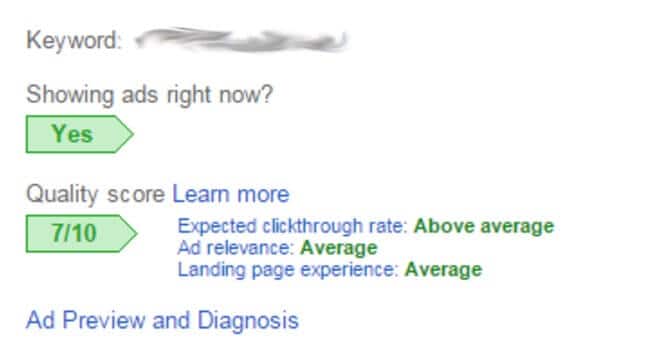Adwords: Quality Score & Ad Rank Explained
Advertisers bid on target keywords that are relevant to their products or services. Bidding starts when a user conducts a search. The AdWords system then finds all ads that match those keywords and competing advertisers are pitted against each other. In a normal auction, the highest bid would win but ad positions aren’t just solely based on who bids the most. Other factors such as ad relevance and quality are also considered.
Google AdWords works like an auction.
Advertisers bid on target keywords that are relevant to their products or services. Bidding starts when a user conducts a search. The AdWords system then finds all ads that match those keywords and competing advertisers are pitted against each other. In a normal auction, the highest bid would win but ad positions aren’t just solely based on who bids the most. Other factors such as ad relevance and quality are also considered.
If your ads aren’t performing well, a large part could be due to your Quality Score. Understanding and improving your scores is key to driving more conversions with AdWords.
Quality Score & Ad Rank Explained
Quality Score is a rating—reported on a 1 to 10 scale—based on the quality and relevance of your keywords and ads. The Quality Score formula consists of the following:
Click through rates (CTR): A high CTR indicates that users are finding your ads relevant and clicking through. The higher your CTR, the better your Quality Score.
Ad relevance: Google evaluates your ad copy and its relevance to your ad groups. Your keyword quality score is also taken into consideration.
Landing page quality: Another factor that is also considered is your landing pages. Landing pages should be relevant to your ad groups and keywords.
Your Google AdWords Quality Score matters for two reasons: Better ad positions and lower prices. Even if a competitor makes a higher bid, it’s possible to achieve a better ad position at a lower cost. Improving the relevance of your campaigns means lowering your overall customer cost acquisition.
Quality Scores are crucial but they’re only part of the equation.
Ad Rank is the metric that combines both your Quality Score and maximum CPC to determine where your ads are eligible to appear in the paid search results. Here’s an example of how this looks:

If there are multiple advertisers bidding for the same keywords, the ad with the higher ad rank wins the top position. Ad extensions are another factor that affects ad rank. If two competing ads have the same scores, the ad that drives a more positive impact with an ad extension would appear higher.
The ad rank of your competitors also determines how much you pay. Your CPC is calculated by the ad rank of the next advertiser below you and dividing by your Quality Score. Here’s an example:

The key takeaway is that ad rank determines where your ads are positioned and your CPC.
How to Check & Improve Your Google AdWords Quality Score
To check your Quality Score, login to your AdWords account and click the Campaigns link at the top. Next, click on the Keywords tab and hover over the white bubble icon in the Status column:

Quality Score is a measure of how relevant Google deems your campaigns. The higher your score, the better your ad positions and the less you pay overall for each click.
Here are ways to improve your Google Quality Score:
- Use small ad groups: Relevance is key. Adding too many keywords to your ad groups spreads yourself too thin. Ideally, your ad groups should only include 15 to 20 keywords and should be tightly related. That way your ad copy is far more relevant to your keywords.
- Refine your keywords: Too many irrelevant keywords can lower your Quality Scores. Continuously refine your keyword list and add negative keywords to exclude any irrelevant terms.
- Test your ad copy: A better CTR not only means more clicks but also improves your Quality Score. Run split tests with different ad copy to boost your CTRs. Experiment with different headlines and body text to see what resonates best with your audience.
- Optimise landing pages: Better landing pages ultimately mean more conversions and higher Quality Scores. Your landing pages should be as relevant as possible to your keywords and ad groups. Be sure to also implement conversion tracking so you can measure performance.
A low AdWords Quality Score typically stems from poorly optimised campaigns between keywords, ad groups, and landing pages. Improving the relevance of each is key to driving better results with your PPC marketing efforts.
Paid Traffic offers AdWords management services that deliver more sales to your business. We manage all aspects of your campaign from the initial setup to ongoing optimisation and more.
Contact us today to schedule a marketing consultation with our PPC experts.
